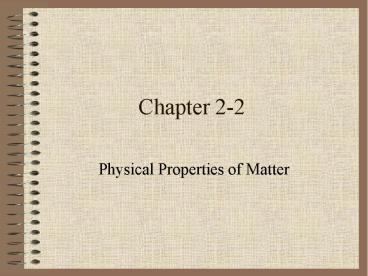Physical Properties of Matter - PowerPoint PPT Presentation
Title:
Physical Properties of Matter
Description:
Chapter 2-2 Physical Properties of Matter – PowerPoint PPT presentation
Number of Views:90
Avg rating:3.0/5.0
Title: Physical Properties of Matter
1
Chapter 2-2
- Physical Properties of Matter
2
Physical Properties
- A physical property of matter can be observed or
measured without changing the matters identity. - Some examples of physical properties are state
(phase), density, solubility, ductility,
malleability, magnetism, and ability to conduct
electricity.
3
Physical Properties
- State (or phase) is the physical form in which a
substance exists. - The states of matter are solid, liquid, gas, or
plasma. - Density is the mass per unit volume of a
substance. - Solubility is the ability of a substance to
dissolve in another substance.
4
Physical Properties
- Ductility is the ability of a substance to be
pulled into wires. - Malleability is the ability of a substance to be
rolled or pounded into thin sheets.
5
Ductility Malleability
6
Density
- Density is a physical property that describes the
relationship between mass and volume. - Density is the amount of matter in a given space,
or volume. - A golf ball and table-tennis (ping-pong) ball
have similar volumes but the golf ball is denser
because it has a greater mass.
7
Density
- In Figure 4, page 46, why do you think maple
syrup is on the bottom of the six liquids? Why
do you think corn oil is on the top? - The denser liquids sink to the bottom of the
flask. The less dense liquids rise to the top. - The order in which the layers separate shows the
order of increasing density.
8
Density
9
Density
- Knowing the density of a substance will tell you
if the substance will float or sink in water. - The density of water (at 4C) is 1.00 g/cm3.
- If an object is less dense than water it will
float in water. - If the object is more dense than water it will
sink.
10
Density
11
Solving for Density
- Density (D) is found by dividing mass (m) by
volume (V). - Units for density consist of a mass unit divided
by a volume unit. - Common units for density are g/cm3, g/mL, kg/m3,
and kg/L.
12
Using Density to ID Substances
- Each substance has a density that differs from
the densities of other substances. - The density of a substance is always the same at
a given temperature and pressure. - What is the density of Helium gas?
- 0.00001663 g/cm3
- Write this in scientific notation.
- 1.663 x 10-5 g/cm3
13
Using Density
- What is the density of Mercury (the only liquid
metal at room temperature)? - 13.55 g/cm3
- Read the Math Focus section of page 47. Try the
three sample questions.
14
Using Density
- What happens to the density of an object if the
object is cut in half? Why? - The density remains the same because cutting the
object in half will divide the mass volume by
the same amount. Also, the density of a
substance remains the same no matter what size it
is. All matter has its own unique density.
15
Interesting Density Fact
- The density of a fresh egg is about 1.2 g/mL, and
the density of a spoiled egg is about 0.9 g/mL.
The density of the egg decreases as it ages
because as it spoils, it loses water through the
tiny pores in the shell. - What would happen to a fresh egg if placed in a
beaker of water? What would happen to a spoiled
egg?
16
Physical Changes
- A physical change is a change that affects one or
more physical properties of a substance. - Freezing water to make ice or sanding a piece of
wood are examples of physical changes. - Physical changes do not change the identity of
the matter involved, only some of the physical
properties.
17
Phase Changes are Physical Changes































